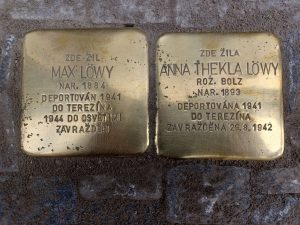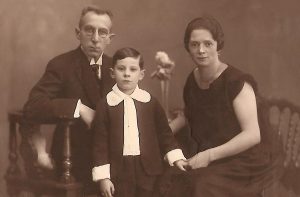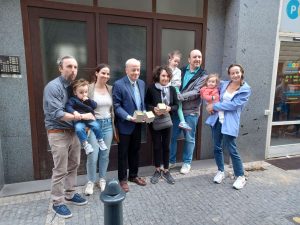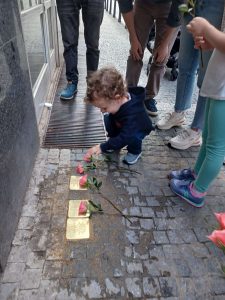 Address: BENEDIKTSKÁ 688/6, PRAGUE 1
Address: BENEDIKTSKÁ 688/6, PRAGUE 1

Born 27. 12. 1884
Last residence before deportation: Prague I
Address/place of registration in the Protectorate: Prague I, Benediktská 6
Transport L, no. 661 (10. 12. 1941, Prague -> Terezín)
Transport Es, no. 295 (19. 10. 1944, Terezín -> Auschwitz)
Murdered

About Max, Anna, and Louis Löwy
Max Löwy was born on 27 December 1884 and grew up in Vienna. At the turn of the century, Max’s father, the son of a Bohemian village rabbi, found work in Vienna in a factory producing ready-made clothes, an emerging industry. In due course he became branch manager of a garment factory in Prague and later in Munich.
Max had hopes of a medical career, but was thwarted by the university quota system for Jews. Instead, he worked in the same factory as his father. After moving to Munich, Max met Anna Thekla Bolz, born on 21 November 1893, who came from a German Catholic family. She converted to Judaism so she could marry Max in a synagogue in 1919. Her family attended the wedding. Louis was born in Munich the following June 14. He was the only child of Max and Anna.
After the Hapsburg monarchy broke apart in 1919, the family opted to become citizens of the new nation of Czechoslovakia, and moved to Prague when Louis was a few months old. During the great inflation of the 1920s, Max lost his job and the family moved into a small apartment where Anna earned a modest income serving lunches to students. In 1924, when the Dawes Plan eased reparations payments imposed on Germany after the Great War, the family moved back to Munich, where Max found work as an accountant in the Adler bed-feather factory.
Max suffered from bronchial asthma, which incapacitated him in the early 1930s and for the rest of his life. In addition to Anna’s small income, the family received health insurance and Max’s disability pension. That pension continued to be sent to Max at his Prague address until 1945, a year after he was murdered in Auschwitz.
After Louis’s bar mitzvah in 1933, Max told him of plans to send him to England to keep him safe. He would live with the family of a business associate in London, the Kings. Louis left for England knowing no English in September 1933 and was enrolled in school. After the passage of the Nuremberg Laws in September 1935, Max and Anna sought to leave Germany. Anna wrote to Louis, asking if he could find a way for them to get to England. The King family applied to the Home Office on behalf of Max and Anna, but the immigration requirements – one thousand pounds and certificates of good health – proved impossible to meet. In January 1936, Louis returned to Munich. With Max incapacitated and Anna distraught, Louis, at age 15, planned the family’s move to Prague. In April 1936 the family moved into a three-room apartment at Benediktská 688/6 in Prague’s Stare Mesto. Louis enrolled in the Mikulansku Gymnasium to prepare for the Matura university entrance exam, and in April 1938 entered the Faculty of Philosophy at Charles University.
Two months following the ceding of the Sudetenland to Germany in October 1938, Louis left the university knowing it was no longer welcoming Jewish students and worked as an English-language tutor to support his family. In March 1939, after Emil Hácha surrendered the government to Hitler, SS storm troopers arrested Louis and held him for three months. Following his release, Louis tried to help the family emigrate, but that avenue closed after war broke out in September. The family remained in Prague until they were told to report to the Trade Palace on 7 December 1941 for transport to Terezin.
Louis became a youth leader in the Magdeburg barracks in Terezin where he cared for a room of thirty boys. The ghetto was rife with hunger, malnutrition, and overcrowding, which led to the spread of dysentery, typhus, scarlet fever, and other infectious diseases. Anna died on 29 August 1942. (A death certificate issued in Terezin said Anna suffered from dementia praecox and listed enterocolitis as the cause of death, but the Nazi regime was known to murder people suffering from mental illness.) Louis buried her with his hands; there were no coffins. Despite teaching being forbidden, Louis organized informal classes and taught English and history and produced children’s plays, which in 1943 were allowed to be publicly performed.
On 27 September 1944 Louis was deported to Auschwitz. Max died on 19 October 1944 on the final transport from Terezin to Auschwitz. Instead of being gassed on arrival at the death camp, Louis was tattooed on his left arm with identification number B12743 and put to work. He and others from Terezin were sent to the Gleiwitz III satellite labor camp near Gliwice. On 17 January 1945, with the Red Army approaching, the Germans destroyed the gas chambers and as much evidence of their crimes as they could. Louis and other inmates were forced to walk westward to other concentration camps on what became known as a death march. One morning on the march, Louis and six companions broke away as others walked on. Over the next several months they made their way to Bucharest, where they registered with the Czech Consulate.
After the war ended in May, Louis and several fellow escapees took a train to Budapest and then traveled to Prague. He attempted to look for his father in Terezin, though he knew it was unlikely he survived. Working with the United Nations Relief and Rehabilitation Agency, Louis during the summer of 1945 helped evacuate about 500 survivors from Terezin to a displaced persons camp established by the American army in Deggendorf, Germany, where he was elected chairman of the Jewish Committee, a self regulating body that ran the camp. In October, Louis learned that Edith (“Ditta”) Jedlinsky from Vienna, whom he had met in Terezin, was alive. She and her mother Hilda were sent to Auschwitz in May 1944 and also put to work, and were freed by the Russian army on 21 March 1945. Louis and Ditta married on 2 December 1945, and the following May, Louis, Ditta, and Hilda emigrated to the United States, settling in Boston, Massachusetts.
Louis and Ditta, who slightly altered their family name to Lowy, had two children: Susan (born in 1951) and Peter (born in 1952). Louis earned a Bachelor’s Degree in Education and Master’s Degree in Social Work from Boston University and a Doctorate in Education from Harvard University. He joined the faculty of the Boston University School of Social Work in 1955, where he served as professor and associate dean until retiring in 1985. He was well known in the field of social work, both in the United States and Europe, particularly with regard to group work and gerontology, having published 21 books and hundreds of journal articles, book chapters, and reports. He died on 22 May 1991 from heart disease. Ditta, born on 9 February 1926, lived until 27 April 2020. Susan married, but had no children of her own, and died in 2025. Peter and his wife Linda have two daughters: Nina who married David Bann and have two daughters, Paige and Lila; and Erica who married Owen Slevin and have a son named Louis. On 16 September 2025 all nine living descendants and spouses traveled to Prague to install Stolpersteine on Benediktská for Max, Anna, and Louis.
Much of this narrative was adapted from The Life and Thought of Louis Lowy: Social Work through the Holocaust by Lorrie Greenhouse Gardella (2011, Syracuse University Press).
